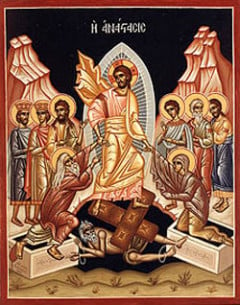
We read in the Apostle’s Creed that Jesus “descended into hell.” Some Christians today are unsure about this idea, but it is an ancient and venerable belief of the church. We commemorate this descent on Holy Saturday, the somber sabbath following Christ’s great labor on the cross.
While his body rested in Joseph’s crypt, the Lord entered hades. In this event we call the harrowing of hell, Christ entered not as victim, but as victor. He came to raze the place. There in the realm of the dead, Christ blasted through Satan’s gates like a battering ram.
Said Cyril of Alexandria, “When the gatekeepers of hell saw him, they fled; the bronze gates were broken open, and the iron chains were undone” (Ancient Commentary on Scripture 11.107).
As fourth-century Spanish poet Prudentius painted the scene, “The door [of hell] is forced and yields before Him; the bolts are torn away; down falls the pivot broken; that gate so ready to receive the inrush, so unyielding in face of those that would return, is unbarred and gives back the dead. . .” (The Daily Round 9).
Proclamation of the gospel
The scriptural foundation for this view rests on a handful of passages. In the language of Ephesians 4, for instance, Christ “descended into the lower parts of the earth” and “led captivity captive.” In the language of the gospel, he came to bind the strong man — the devil — and loot his house, the treasure of Satan being the souls of men. To these passages add 1 Peter 3.19, in which the crucified Christ “proclaimed to the spirits in prison,” that is, in hades.
Some translations render that word “preached,” but the idea is one of announcement, a declaration of victory, which is exactly how fourth-century theologian and hymnographer Ephraim the Syrian saw it:
[T]he voice of our Lord sounded into Hell, and He cried aloud and burst the graves one by one. Tremblings took hold on Death; Hell that never of old had been lighted up, into it there flashed splendors, from the Watchers [angels] who entered in and brought out the dead to meet Him, who was dead and gives life to all. (Nisibene Hymns 36.11)
Christ “shouted with authority to the suffering souls, according to the words of the new covenant,” said Cyril, “so that he might save all those who would believe in him” (ACS 11.107).
Melito of Sardis, writing in the late second century, presented this as a bold proclamation as well:
“It is I,” says Christ,
“I am he who destroys death,
and triumphs over the enemy,
and crushes Hades,
and binds the strong man,
and bears humanity off to the heavenly heights.”
(On Pascha 102)
Binding the devil, defeating death
Satan never saw it coming. Christ bound the strong man, raided his house, and liberated the captives.
A classic iconographic depiction of the resurrection shows Christ ascending from the grave, Hades’ doors broken and lying in a crosswise pattern as the Lord takes Adam and Eve by the hand — takes all of fallen humanity by the hand — and frees them from their age-old imprisonment to the devil. Directly referencing the gospel imagery, the icon often depicts Satan as an old man, bound beneath the feet of the risen Christ.
Not only was Satan defeated, but so was death itself. In Nisibene Hymns, Ephraim personified death and put these words on his lips:
My throne was set for me in Sheol: and one arose that was dead, and hurled me from it. . . . In a man that was slain lo! there has entered into Sheol He that takes her captive. I used to take all men captive: the Son of Captivity Whom I took captive has taken me captive. He Whom I took captive has led her away and is gone to Paradise. (38.1)
The harrowing of hell represents the victory of Christ over all his enemies and the path of salvation opened to all who would believe. While some contemporary theology has no room or understanding of this doctrine, Christians are invited to see it as a vision of the conquering Savior, whose triumph is so complete, so thorough, so exhaustive that he descends to hell and empties it of every soul who responds to his call.
Because of harrowing of hell, we can join King David and sing, “Bring my soul out of prison, that I may praise your name” (Ps 142.7, 141.8 LXX).











